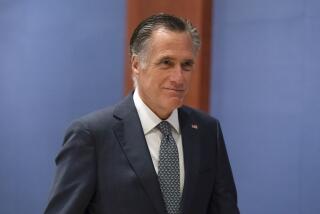Senate Welfare Plan Altered to Make States Keep Up Share of Aid
- Share via
WASHINGTON — Under pressure from Democrats and moderate Republicans, Senate leaders agreed during a closed-door meeting Tuesday to modify their welfare reform blueprint by requiring states to maintain a certain level of state contributions toward assistance programs.
The provision, which specifies that state spending on welfare cannot fall below 80% of current levels, would prevent states from taking advantage of the new freedom they would receive under the GOP legislation by curtailing their own contributions and relying entirely on federal block grants to finance scaled-back welfare programs.
The accord was reached because moderate Republicans threatened to join Democrats to pass an even higher “maintenance of effort” provision.
The agreement, reached at the weekly GOP lunch, showed how moderate Republicans can wield influence well beyond their numbers when they cooperate with Democrats.
The House bill, which was passed earlier this year, has no maintenance-of-effort provision.
Both plans cancel the 60-year federal guarantee of cash assistance to poor mothers with children and give states lump-sum block grants so they can design and run their own programs for moving recipients from welfare to work.
The Senate plan is likely to face a final vote later this week.
Senate Minority Leader Tom Daschle (D-S.D.) said that the maintenance-of-effort provision is a clear victory for Democrats, who had been defeated on many fronts as they attempted to amend the GOP plan.
The GOP leadership “didn’t want any maintenance of effort,” Daschle said.
President Clinton, Senate Democrats and moderate Republicans had warned that by failing to require states to maintain spending levels, the GOP plan would incite a “race to the bottom,” with states redirecting money that they used to spend on welfare to other expenses.
Sen. Olympia Snowe (R-Me.), a moderate, argued that without the provision “we risk having nearly half of what is now spent on welfare siphoned off to other programs.
“That may mean that we won’t have the kind of commitment toward child care or job training or education programs that are absolutely essential and necessary if we’re going to make welfare reform work,” she added.
A Republican staff member said that the caucus had no choice but to embrace the provision, because the Democrats’ amendment “would have passed otherwise.”
Republican senators had argued that by requiring states to continue to spend most of the money they now spend on assistance programs, the federal government was taking away states’ incentive to create effective welfare reform programs to move people into jobs.
“In my state, the people of Missouri spell reform R-E-D-U-C-E,” said Sen. John Ashcroft (R-Mo.), a former governor.
The proposed modification is a slap to Republican governors, who have lobbied consistently that states should be able to reap the financial benefits of cutting their welfare caseloads.
“Why should states moving clients from welfare into work slots have to maintain that same level of funding?” asked LeAnne Redick, a spokeswoman for Michigan Gov. John Engler, a Republican. “You’re almost assuming welfare reform isn’t going to work.”
More to Read
Get the L.A. Times Politics newsletter
Deeply reported insights into legislation, politics and policy from Sacramento, Washington and beyond. In your inbox twice per week.
You may occasionally receive promotional content from the Los Angeles Times.









